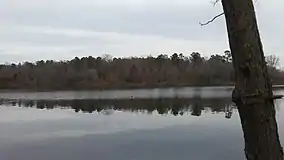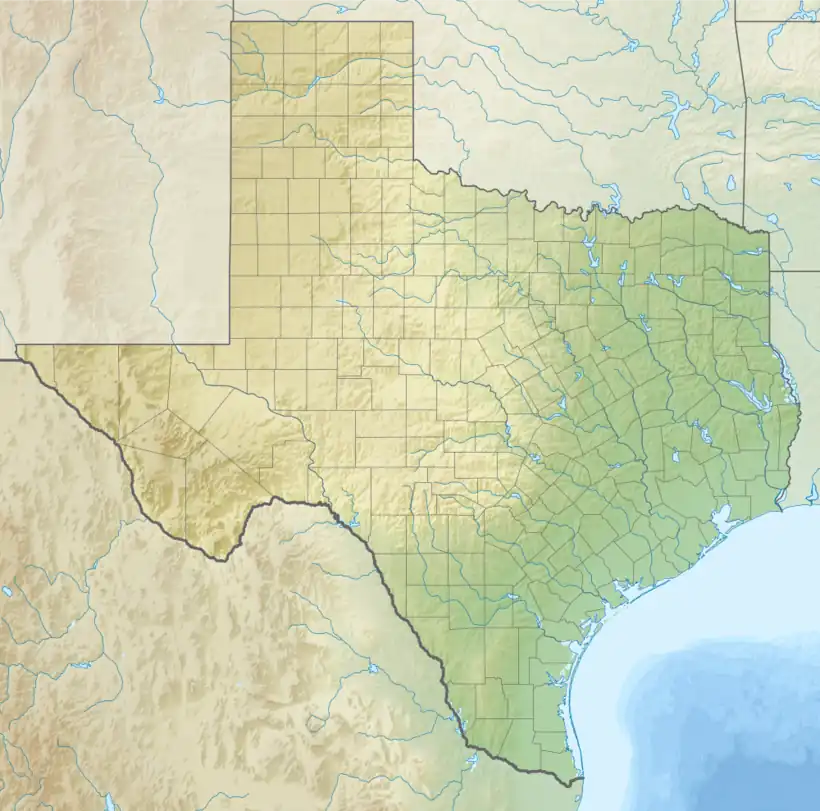| Lake Bob Sandlin State Park | |
|---|---|
 Lake Bob Sandlin State Park in December 2018 | |
  | |
| Location | Titus County, Texas; Camp County, Texas; Franklin County, Texas; Wood County, Texas |
| Nearest city | Pittsburg |
| Coordinates | 33°03′14″N 95°05′57″W / 33.053955°N 95.099155°W |
| Area | 639.8 acres (258.9 ha) |
| Established | 1987 |
| Visitors | 79,274 (in 2022)[1] |
| Governing body | Texas Parks and Wildlife Department |
Lake Bob Sandlin State Park is a state park in Titus County, Texas managed by the Texas Parks and Wildlife Department. The park covers 639.8 acres of land on the northern shore Lake Bob Sandlin about 10 miles southwest of Mount Pleasant.[2]
History
The land in the area was occupied by the Caddo people until the mid-1800s. Fort Sherman, a Republic of Texas stockade, was established by 1838, and eventually the land was used for farming and ranching by settlers, until it was acquired by Texas Parks and Wildlife Department in 1978.[3]
Lake Bob Sandlin is located on Big Cypress Creek. It was impounded in 1977 with the construction of the Fort Sherman Dam. Lake Bob Sandlin is named after Bob Sandlin, a major proponent of the lake, who was a local businessman, civic leader, and president of Titus County Fresh Water Supply District No. 1.[4]
Facilities and activities
The park offers over 3 miles of hiking and biking trails, a fishing pier and boat ramp, and opportunities for picnicking, geocaching, kayaking, and other outdoor activities. It also features campgrounds with hookups, covered shelters, and primitive cabins for overnight stays.[5]
Nature
Animals
The park is located at the intersection of the Piney Woods and Blackland Prairie ecoregions, and thus has a diverse variety of wildlife including white-tailed deer, raccoons, coyotes, gray foxes, fox squirrel, and bobcats. There are at least 188 bird species that have been sighted in the park such as the bald eagle and eastern bluebird, and the lake offers many species of fish, including Florida bass, and channel catfish.[6][7] A trout pond in the park is stocked with rainbow trout.
Flora
Plants documented in the park include Hercules club, sassafras, winged elm, sweet gum, eastern red cedar, American elm, white oak, Shumard red oak, coral honeysuckle, devil's walking stick, hackberry, eastern redbud, wild grape, red buckeye, American beautyberry, loblolly pine, red maple, common persimmon, and poison ivy.
References
- ↑ Christopher Adams. "What is the most visited state park in Texas? Here's the top 10 countdown". KXAN.com. Retrieved November 21, 2023.
- ↑ "Lake Bob Sandlin State Park History — Texas Parks & Wildlife Department". tpwd.texas.gov. Retrieved March 25, 2022.
- ↑ "Lake Bob Sandlin State Park History — Texas Parks & Wildlife Department". tpwd.texas.gov. Retrieved March 25, 2022.
- ↑ "Lake Bob Sandlin". East Texas. East-Texas.com. Retrieved April 15, 2023.
- ↑ "Lake Bob Sandlin State Park — Texas Parks & Wildlife Department". tpwd.texas.gov. Retrieved March 25, 2022.
- ↑ "Lake Bob Sandlin SP (Titus Co.) (PPW-E 104), Titus County, TX, US - eBird Hotspot". ebird.org. Retrieved March 25, 2022.
- ↑ "Lake Bob Sandlin State Park Nature — Texas Parks & Wildlife Department". tpwd.texas.gov. Retrieved March 25, 2022.
External links
- Lake Bob Sandlin State Park - official site
- U.S. Geological Survey Map at the U.S. Geological Survey Map Website. Retrieved February 14, 2023.
33°03′25″N 95°05′38″W / 33.057°N 95.094°W